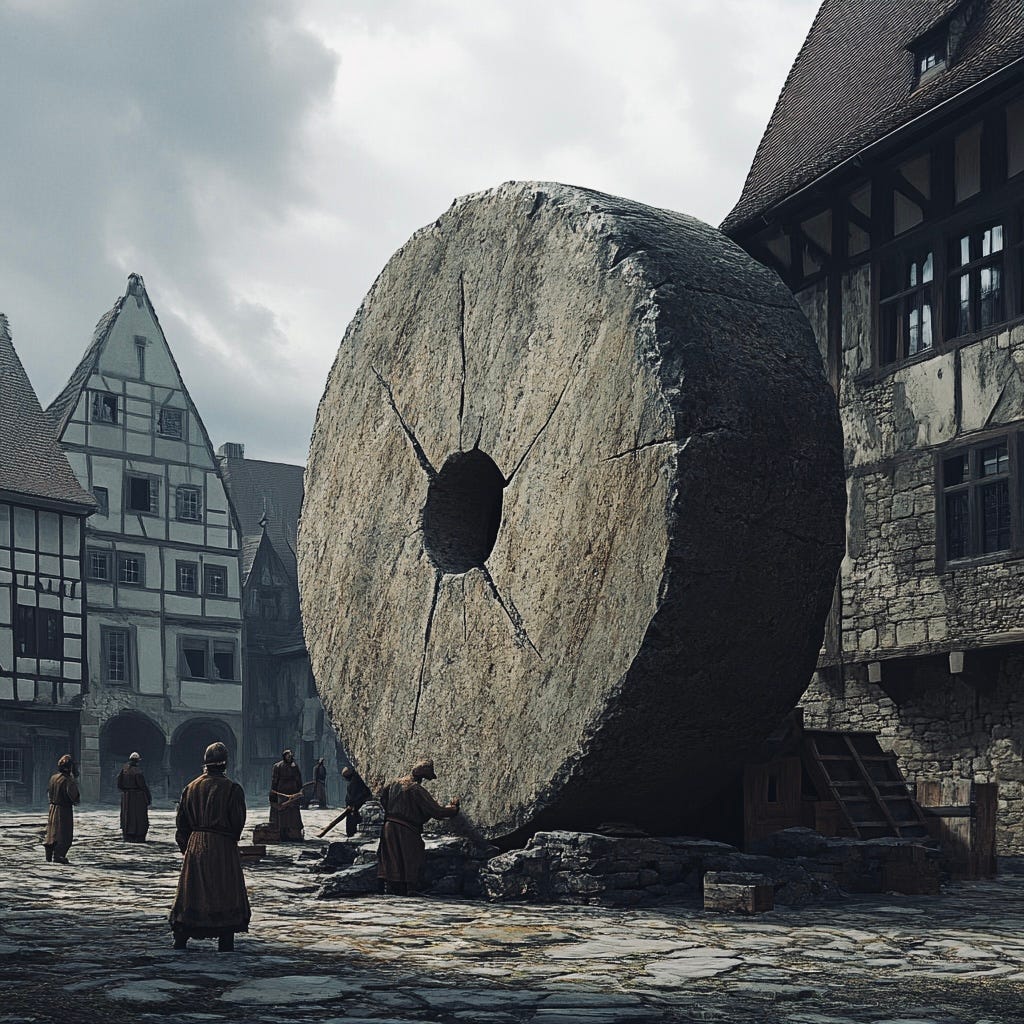“Der Wacholderbaum” (The Juniper Tree) is one of the original stories from the 1812 edition of Kinder- und Hausmärchen (Children and Household Tales) by Jacob and Wilhelm Grimm. A Low German version called “Von dem Machandelboom” (From the Almond Tree) follows the same plot but makes an arboreal adjustment whereby the fatal juniper berries become almonds.
Many readers consider this to be the most violent and brutal of the Grimms’ so-called children’s tales, although its macabre elements do not differ much from those found in Hoffmann’s 1845 children’s book, Der Struwwelpeter (Sloppy-Haired Peter). Whatever the case, “The Juniper Tree” was omitted from many Biedermeier editions of Grimms’ fairy tales; and it is doubtful that Disney will be picking it up anytime soon.
What follows is a retelling more so than an adaptation, since I have adhered to the original sequence of events and retained its vaguely medieval atmosphere. I have expanded the poem that serves as the centerpiece of the tale and cut a few paragraphs that seemed unnecessarily repetitive. I have also added a few embellishments and situated the action in the Rhineland.
The Juniper Tree
Once upon a time, a wealthy merchant from Cologne acquired a crumbling mansion in the countryside and made it into his abode. The edifice had once been a convent, and it was rumored that scores of nuns (companions of Saint Ursula) had been beheaded there by the invading Huns sometime in the fifth century of Our Lord. On a hill before the mansion loomed an old juniper tree, whose stately form dominated the forlorn scene.
The merchant’s neighbors informed him that the pious woman, who was often seen praying day and night under the tree, was in all probability the apparition of one of the murdered virgins from long ago. But the merchant dismissed these rumors, and, being of a kindly disposition, resolved to introduce himself to the lovely trespasser so as to reassure her that, though he was master of the property, he would not deter her from visiting the tree whensoever she wished.
The consequence of this interview was that the two fell immediately in love and were soon married. The woman prayed to God for a child. But as the seasons rolled on, none came. One winter morning, as she sat peeling an apple beneath the tree’s branches, the blade slipped and she cut her finger. As the blood fell on the powdered snow, she sighed and said, “If only I had a child as red as blood and as white as snow.” A sunbeam broke through the clouds and shone on her; and she was comforted.
In the spring, the juniper shed its blossoms; and by the seventh month its berries were ripe and plump. The woman (now heavy with child) plucked and ate of them. But she became violently ill, and began to waste away. Summoning her husband to her bedside, she smiled and said, “When I die, bury me beneath the juniper tree.”
In her ninth month, she brought forth a male child—as red as blood and as white as snow. After cradling the newborn in her arms, the woman closed her eyes and passed away. Though beside himself with grief, the merchant summoned his servants and ordered them to bury his beloved as she had asked: “Let the roots of the juniper drink of my beloved’s sweetness.” For forty days, he mourned. And forty days later, he was wed again.
His new wife banished the servants from the mansion, assuring him that she was more than capable of managing the household’s economies. A second child, a daughter, soon followed. The siblings loved each other and became inseparable. But the boy’s stepmother was resentful, because she knew that only he would inherit the estate were the merchant to die. So when her husband was not around, she treated the boy coldly. But as for her daughter Marlene, she showered her with affection.
The merchant went to Cologne one day for business. Marlene came to her mother and asked if she could have an apple. “Of course,” the woman said, leading her up the staircase into a chamber in which stood a wooden chest with a razor-sharp lock on its lid. Her mother told Marlene to take an apple from the bottom of the chest. The girl reached in and removed one, but then looked at it. “Mama, shouldn’t my brother have an apple first?”
“How right you are,” the woman said, snatching it from her daughter’s hand and restoring it to the chest. “Tell him to come up. And then go outside and play in the woods with your friends. I have much to do, and I don’t want you in the way.” Marlene departed; and soon the boy appeared at the threshold. “Your sister has persuaded me to give you a gift,” the wicked stepmother said, smoothing her brow with her forefinger. “Open the chest and look inside.”
The boy knelt and lifted the lid. When his head was under it, the stepmother slammed the lid shut, instantly decapitating him. The head landed on the apples and caused them to roll around. The evil woman exulted in what she had done. But in her zeal to murder her stepson, she had not devised a plan as to how to explain what had happened to his father. As she stared at the torso quivering in its death throes, a scheme matured in her mind.
She carried the body down the steps and propped it in a chair outside near the entrance. Then she fetched the severed head, along with one of the apples from the trunk, and returned to the corpse. From her pocket she withdrew neckerchiefs and wound these round the neck. Then she put the head on top so it looked like the boy was napping in the chair. Placing the apple in the cupped palms, she resumed her chores.
When Marlene came back in the afternoon, she saw her brother dozing in the chair: “Are you going to eat that apple or not?” When he didn’t answer, she went to her mother and complained. “Tell him to give you the apple,” her mother said. “And if he doesn’t, cuff him on the ears.” The girl went back outside. When her brother did not answer and refused to yield the apple, she boxed his ears and his head fell off. The girl ran to her mother, crying, as she told her what happened.
“You’ve killed your brother, Marlene,” her mother said. “And your father will be heartbroken.” The girl tore her hair and did not know what to do. “We must hide your crime,” the evil woman said. “Go to the kitchen and lay out the carving knives. We’ll chop him up and prepare a savory stew for your father.” Though depressed, the girl obeyed. Hours later, the wicked woman scraped her stepson’s flesh from the cutting board into the sizzling broth.
The merchant returned that night and took his seat at the table. “Where’s my son?” he asked.
“Gone,” his wife said. “He went to visit his uncle far away.”
The merchant shook his head, saying that he wished that his son had at least said goodbye to him. Then he took up his spoon and tasked the stew that had been ladled out into his bowl. “This is delicious!” he apostrophized, reaching for the tureen. “I must eat it all, because it is all mine.” As he chewed the meat, he cast the bones on the floor.
When her father had retired into his bedchamber, Marlene crawled under the dinner table and collected her brother’s bones (including his knuckles and teeth), placing them in a silk bag. The next morning she took the bag outside and buried it under the juniper tree. Suddenly, the tree’s branches separated and closed, as if clapping for joy. Then a black smoke seeped out of the bark and a beautiful white bird, unlike any Marlene had ever seen, emerged from the smoke.
The bird flew to Cologne and landed on a gabled roof across from a goldsmith’s shop, where it began to sing:
My stepmother killed me. My poor father ate me. My sister, Marlene, gathered up my dry bones. She bound them in silk and then tenderly laid me beneath the sad tree where my dead mother groans. Tweet-tweet! Hear the song of this lovely white bird. Tweet-tweet! See the ghost of this fledgling take flight. I’ll charm all Cologne with this song you have heard till the wrongs I have suffered have all been set right.
“Sing it again!” the goldsmith cried from his window. Then he ran outside and repeated: “Sing it again!” Around his neck he wore a thick golden necklace.
“There’s a heavy price for what you ask,” the bird said. “Give me the necklace!”
In his joy, the goldsmith threw the chain into the air, but it was so weighty it fell swiftly toward the earth again, but not before the bird had swooped down and seized it with one claw. Then the bird obliged the goldsmith and sang the song again.
Next, the bird flew to a shoemaker, landing on his roof and singing the same verses. The shoemaker waddled out and begged the bird for a second rendition and received the same answer: “There’s a heavy price for what you ask.”
So enamored had the shoemaker’s wife been, that she too came outside bearing a pair of heavy slippers bound together with twine. She said they were girls’ slippers and that only a maiden of pure heart could lift her feet when wearing them. The bird grabbed the slippers with its other claw and sang the song again before flying off.
Twenty chiselers were working on a huge millstone whose eye was so wide it would have required a beam as thick as a ship’s mast to turn it in the mill house. When the workers heard the bird’s song, they listened, enraptured. They begged to hear it again. But on learning of the heavy price, the men were downcast. For they were all poor. But the miller overseeing their work told the bird that he would give away the millstone to hear the song again.
Once the bird had repeated the song, he flew into the millstone’s eye. Magically, the great weight rose into the air. Winnowing his wings, the white bird drove the gray clouds before it. The lightning quivered but made so sound as the millstone drifted over the countryside in the direction of the juniper tree.
In the gloomy mansion, the merchant sat in the parlor with his wife and daughter. Suddenly, he raised his head. “I feel unaccountably happy, as if I’m about to see an old friend.”
“I wish I shared your enthusiasm, husband,” the evil woman said, looking up from her needlepoint. She thought she had heard thunder; and it distressed her that neither her husband nor daughter showed any signs of having heard it too. Suddenly, she flung her work aside and her teeth began to chatter, because a bird singing outside:
“My stepmother killed me. My poor father ate me. . .”
“Dear wife,” the merchant said. “Do you hear that lovely song? Look how the sun is streaming in through the curtains. The whole world smells like cinnamon.”
“My sister, Marlene, gathered up my dry bones. . .”
Marlene leaned forward in her chair and sobbed. But her father rose and said, “I really must see this bird!”
“Don’t go!” his wife exclaimed. “I fear the end is near!”
The merchant ignored her and went outside, returning with the golden chain round his neck. “Look at this priceless gift the bird gave me!” Marlene embraced her father and said, “I’ll go outside, too. Maybe the bird has a gift for me!”
And with that, she was gone. The evil stepmother clapped her palms to hear ears, as she heard the song again:
My stepmother killed me. My poor father ate me. My sister, Marlene, gathered up my dry bones. She bound them in silk and then tenderly laid me beneath the sad tree where my dead mother groans.
Marlene returned, gaily skipping and dancing about the parlor. She told her parents that the bird had given her the slippers she now wore that made her feet feel so lightsome.
“I can bear it no longer,” her mother said, rushing to the door. “I can’t breathe. It’s as though a great weight were pressing down upon me.” No sooner had she run outside than the millstone fell from the sky and crushed her to a pulp. Marlene and her father ran to the door. The day was bright; and in the sunbeams, they saw the white bird settle on the topmost branch of the juniper tree.
The bird transformed into Marlene’s brother, whose complexion was as red as blood and as white as snow. The boy opened his eyes and leapt from his perch, singing as he glided toward his jubilant father and sister:
Tweet-tweet! Hear the song of this lovely white bird. Tweet-tweet! See the ghost of this fledgling take flight. I’ll charm all Cologne with this song you have heard till the wrongs I have suffered have all been set right.














Another wonderful tale! A lot of attention is given to the moral "lessons" imparted by fairy tales, but I've always appreciated their deep sense of justice. Maybe that seems like splitting hairs, but there's something so satisfying in seeing the cruel and unfair get their comeuppance. I wonder if the ideal world they model is fantastical, not because it's supernatural, but because it's just.
Fascinating! A lovely retelling. Thank you for sharing.